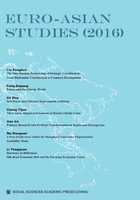
Russia and the Outside World
Abstract: After the collapse of the Soviet Union, Russia is in need of re-establishing its ties with the outside world, which is a vital part of the country's transformation and development. The relationship between Moscow and the external world has mirrored a historical process in which the gap between its internal development and the external changes has increasingly enlarged. Such a process and changes within Russia's domestic political order have influenced each other. At key historical moments, given the historical factors including the eastward expansion of the North Atlantic Treaty Organization (NATO), the Bosnian War, the political ecology and the first Chechen War, Russia failed to integrate into the Western system. Till today, the country has yet to strike a balance between integrating into and enjoying an equal footing with the outside world. The construction of both its internal and external spheres lacks its own recognition as a modern state. Moreover, since the end of the Cold War, a series of international events have resulted in growing mutual suspicions between Russia and the external world. Eventually, Moscow started to head toward isolationism. Despite all these, the biggest threat to Russia's potentially being isolated or ending up with isolation comes from its internal factors.
Keywords: Russia, the outside world, political development
The relationship between Russia and the outside world mainly refers to changes of Russia's peripheral strategies as well as the changes in its ties with the West. Its peripheral strategies primarily concern Russia, the Commonwealth of Independent States (CIS) and Eastern European countries. Moscow's relations with the West fundamentally reflect the characteristics of Russia's connectivity and interactions with the world. Since the outbreak of the Ukrainian crisis, Russian President Vladimir Putin gave several significant speeches in 2014, such as the speech on March 18, the July 22 address to the Russian Security Council,
the July 22 address to the Russian Security Council, and the annual Presidential Address to the Federal Assembly on December 4.
and the annual Presidential Address to the Federal Assembly on December 4. These speeches have one thing in common – taking the Crimean issue and the Ukrainian crisis as examples and briefly expressing the international political views of the Russian elite. Generally speaking, there are three points. To begin with, Russia is a victim of geopolitical games after the end of the Cold War. In addition, the country has always been facing direct and indirect US-led threat from the outside world, including the breach of the Russian constitution and military coups at home and the squeeze of Russia's strategic space by unipolar hegemony from abroad. Furthermore, Russia's strategic focus will be the post-Soviet space and its surrounding nations in the future. Then what has changed in the relationship between Russia and the outside world after the collapse of the Soviet Union? Why has the change made Russia feel like a victim?
These speeches have one thing in common – taking the Crimean issue and the Ukrainian crisis as examples and briefly expressing the international political views of the Russian elite. Generally speaking, there are three points. To begin with, Russia is a victim of geopolitical games after the end of the Cold War. In addition, the country has always been facing direct and indirect US-led threat from the outside world, including the breach of the Russian constitution and military coups at home and the squeeze of Russia's strategic space by unipolar hegemony from abroad. Furthermore, Russia's strategic focus will be the post-Soviet space and its surrounding nations in the future. Then what has changed in the relationship between Russia and the outside world after the collapse of the Soviet Union? Why has the change made Russia feel like a victim?